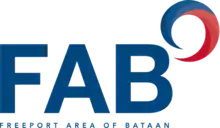Authority of the Freeport Area of Bataan
The Authority of the Freeport Area of Bataan (AFAB) is a government agency attached to the Office of the President of the Philippines that operates and manages the Freeport Area of Bataan (FAB) in Mariveles, Bataan, Philippines.
 Logo | |
.jpg.webp) Freeport zone | |
| Agency overview | |
|---|---|
| Formed | June 30, 2010 |
| Jurisdiction | The Whole Area of Freeport Area of Bataan |
| Headquarters | AFAB Administration Bldg., FAB, Mariveles, Bataan 2106 14°26′N 120°29′E |
| Agency executive |
|
| Parent agency | Office of the President of the Philippines |
| Website | afab.gov.ph |
The FAB was originally designed as an Export Processing Zone.[1] Its existing infrastructures include 11 Standard Factory Buildings (SFB) with three stories each, and a total working area of 8,352 m2 (89,900 sq ft). per SFB. It is currently home to over 50 locators engaged in manufacturing products for export ranging from tennis balls to yachts. AFAB also has two locators using their facilities for warehousing, one locator engaged in animal feeds processing and an enterprise currently constructing a clean coal power plant. These enterprises employ a total of 13,443 workers.
The objective of the AFAB is to revive the area and expand the Freeport. To accomplish these objectives, the Freeport seeks to attract more locators in the manufacturing, Business Process Outsourcing (BPO), electronics industries and green industries, among others. It is also seeking investors to boost its tourism capabilities by refurbishing its existing recreational facilities. The AFAB is also targeting new investors to build hotels, entertainment establishments, duty-free shops, resorts, team-building facilities, and sports facilities, among others, to encourage the influx of local and foreign tourists. It also hopes to attract a medical center to the Freeport with a view towards medical tourism. Finally, it aims to encourage universities and colleges to locate in the area, to create and sustain a talent pool that can service the human resource needs of the locators.
History
In 1972, the Bataan Export Processing Zone (BEPZ) became the first official economic zone in the Philippines through Republic Act 5490 of 1969. The BEPZ was one of the most progressive communities in Luzon during its first decade of operation. The area attracted over one hundred multinational locators.
Despite the economic activity and growth in the area brought about by the development of the Subic and Clark freeports in the 1990s, the development in the BEZ stagnated and then declined rapidly.
To put a halt to the decline of the BEZ and allow the zone to fulfill its original mandate to become a catalyst for progress and development in the region as well as create employment and livelihood opportunities for the people, House Representative Albert S. Garcia (Congressman, Second District of Bataan) authored a bill for the conversion of then BEZ into a freeport. Congress thereafter passed the Freeport Area of Bataan Act (RA 9728), which was enacted into law on October 23, 2009. This Act converted the BEZ into the FAB, a special economic zone and Freeport with a dedicated governing authority, the Authority of the Freeport Area of Bataan (AFAB).
Eight months after the enactment of RA 9728 into law, AFAB officially started its operations on June 30, 2010 which marked the turnover of the zone's operations and management from Philippine Economic Zone Authority (PEZA) to AFAB.
Administration
The Authority of the Freeport Area of Bataan (AFAB) is headed by an Administrator who sits as Chairman of the 9-member AFAB Board of Directors. Each Board member represents a sector that is vital to the growth and development of the FAB. All members, including the Chairman, are appointed by the President of the Philippines.
The AFAB may grant to its FAB enterprises incentives under the Special Economic Zone Act of 1995 or the Omnibus Investments Code of 1987. The AFAB has the power to operate on its own, or to license, tourism-related enterprises, including games, gambling casinos, horse-racing and other recreational and sports facilities, subject to the approval and supervision of PAGCOR.
See also
References
- "Republic Act 9728" (PDF). Archived from the original (PDF) on 2012-09-23. Retrieved 2013-05-07.